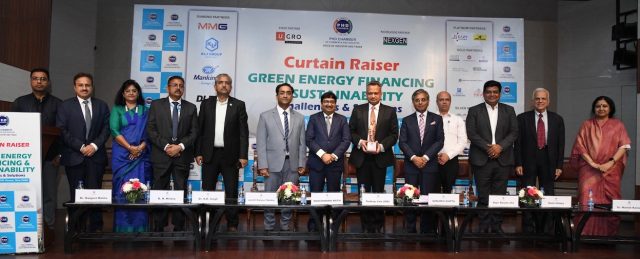We, as a nation, are on a remarkable path and we will definitely surpass it, said, Shri Sudeep Jain (IAS), Additional Secretary, Ministry of New and Renewable Energy, Government of India, referring to the 500GW renewable energy target by 2030. He was speaking at the Curtain Raiser of PHDCCI conference on Green Energy Financing & Sustainability: Challenges & Solutions held on March 27 at PHD House, New Delhi. Representatives of industry, government and academia were present on this occasion to deliberate on crucial aspects of green energy financing and sustainability.
We do have several challenges, that’s why chambers like PHDCCI are required to bring on the table the issues and create awareness in industry, Mr. Jain emphasized.
As individuals, we need to conserve energy; it is the best investment without any subsidy. He also apprised about the PM Surya Ghar program and emphasized the critical role of financing mechanisms in driving sustainable initiatives in the renewable energy sector.
He further added, 2023 marked the hottest year yet, surpassing the crucial 1.5-degree Celsius target that the global community strives to maintain. It’s evident that unless we collectively recognize climate change as a paramount challenge, finding solutions and working towards mitigation will remain elusive. India’s ambitious goals underscore the urgency of addressing this pressing issue head-on.
Mr. Shachindra Nath, Chair, BFSI Committee, PHDCCI, said that the gap between capital providers and consumers is evident across industries. Bridging this divide required a sustained dialogue, where financing institutions see sustainability not just as a mandate but as an attractive opportunity. Through continuous learning and collaborative efforts, they aim to formulate solutions that resonate with industry leaders and drive meaningful change.
Mr. Sanjeev Gupta, Co-Chair, BFSI Committee, PHDCCI, emphasized the need for more efficient technology to be catalyzed. He added, as we succeed, new challenges arise in familiar or new areas. Land, evacuation, and storage are on-going major issues, with land being particularly important. Even a top corporate entity in our country faces these challenges. We need to identify these issues not to criticize but to find practical solutions. While not every solution works everywhere, each can offer benefits suited to different situations.
Dr. Ranjeet Mehta, Executive Director, PHDCCI, said, the green energy transition is extremely important. The initial cost of such a transition is very high. Addressing carbon emissions is crucial in our journey towards sustainability. Energy transition plays a pivotal role in this endeavor, making sustainability a success. Therefore, there is a need for green financing. However, there are certain challenges; hence plans can be formed to achieve 500 GW of renewable energy by 2030.
Ms. Surbhi Goyal, Senior energy Specialist, World Bank shared that the World Bank comes and takes the first mover risk. Tariff distribution companies are important, and their participation is also crucial to strike a balance between renewable energy and fossil fuel energy. As in states that are fossil fuel dominators, bringing them into the fold of renewable energy is essential. Also, policy and regulation systems across the country can be improved through standardization.
Dr. R K Singh, Chief General Manager, SIDBI outlined the dual role of development financial institutions: the market maker role and the circuit breaker role. He added, in our green financing agenda our focus was to simplify processes, eliminate biases, and enhance the capacity of our value chain to transform the entire ecosystem. He further discussed the Udhyam Sangyan initiative of SIDBI for MSMEs, aiming to enhance their capabilities and open new horizons for growth.
Mr. B N Mishra, Senior Advisor, IBA, discussed the significant resources in the banking sector, stating that the banking sector has 138 players and 116,000 branches with around 200 trillion deposits as resources. He further elaborated on capacity building, and said IBA works closely with RBI, Ministry of Finance, and MNRE. There are many standing committees, and every bank now has an ESG vertical. This time can be called the Green Revolution Part 2, hence It’s imperative to recognize the collaborative effort, where stakeholders across sectors come together to drive meaningful change.
Mr. Joshit Ranjan Sikidar, Director (Finance), SECI; Dr. Manish Karna, Head- Business Development, Adani Greens; Mr. Rahul Dubey, Investment Director, IFU; , among others, the esteemed participants deliberated on their areas of specialization in green energy financing and sustainability. Their contributions added valuable perspectives to the discussions, further enriching the dialogue on sustainable advocacy. The event overall set the stage for comprehensive dialogue and collaborative efforts towards achieving India’s renewable energy goals.
The Curtain Raiser was well supported by U GRO Capital, NEXGEN Financial Solutions Pvt. Ltd. and PHDCCI annual sponsors, DLF Ltd; Jindal Steel & Power; KLJ Group; Multani Pharmaceuticals Ltd; Marble City; MMG Group; Radico Khaitan Ltd; Uflex Ltd; Vestige; Eazy ERP Technologies; JK Tyre & Industries Ltd; Sagar Group of Industries; Superior Industries Limited; Samsung India Electronics; Oswal Greentech; Apeejay Stya Group; Blossom Kochhar Beauty Products Pvt Ltd; DCM Shriram; R E Rogers; Trident Group; Ajit Industries Pvt Ltd; Bhagwati Plastic and Pipes Industries; Central Coalfields Ltd; DD Pharmaceutical Ltd.; Hindware Sanitary; Jindal Steel; Modern Automobiles; P S BEDI & Co.
Disclaimer: This media release is auto-generated. The CSR Journal is not responsible for the content.


